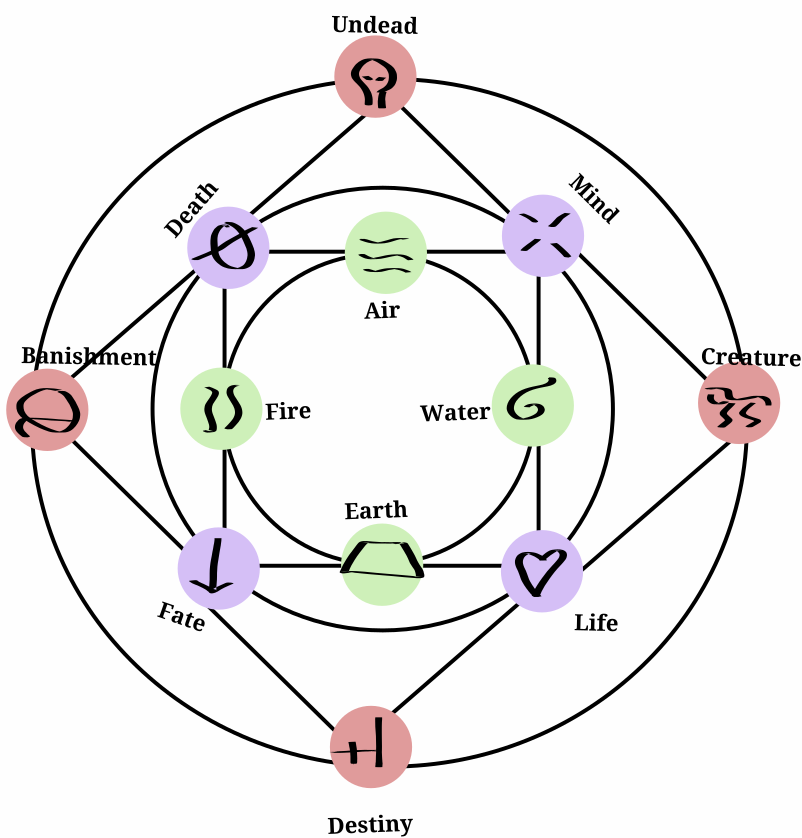

Yea, ‘bottom-up’ is a great way to put it.
Like, I can still add a totally different gnoll tribe later on in a module, or just add one ‘from the icy South’, and let the GM imply a world without yammering about it.
I’ve made an open source RPG, available on itch and gitlab.
Domain: ttrpgs.com
Git:
ssh -p 2222 soft.dmz.rs


Yea, ‘bottom-up’ is a great way to put it.
Like, I can still add a totally different gnoll tribe later on in a module, or just add one ‘from the icy South’, and let the GM imply a world without yammering about it.


The thing is, this is still tying culture to race.
I had a go at breaking past this barrier, and found it extremely difficult. I started with the idea that geography informs culture, and made a split between elves in the frozen South and elves tropical jungles. This left me with half the normal space to write about elven cultures.
So I figured I could do 2-3 cultures per race, and end up with (5 x 2.5) ~13 descriptions of fantasy cultures. But who wants that? I can’t use that much in my own game. Writing because you have to write something makes for bad writing.
Another route is to limit cultures even more. Maybe dwarves and gnomes basically live the same way, as do gnolls and humans. But then it seems odd that gnolls having the mouth of a canine changes nothing about them. If nothing else, their language has to be deeply different, given the lack of lips.
So in the end, I’ve decided to just fill in a very small part of the world, and leave an underlying assumption that elves, humans, and gnolls might do things differently elsewhere.


Goblin culture doesn’t have a concept of “Property”. A stick on the ground and a tool in a locked shed are equally up for grabs if a thing needs doing. They casually take and leave things all over their communities, eat from communal pots, and genuinely Do Not Understand why the Core Races are so Angry and prone to Violence all the time.
This is nice. It reminds me of the Piraha notion of ownership. If they swing by someone’s place to use their boat, but the person isn’t there, they’ll just use the boat anyway. Once they return with a catch, the boat-owner gets the first pick (e.g. the biggest fish), because it’s ‘their boat’. So they still have property rights, but they overcome the potential waste of someone not using a boat.
I have cultures’/ races write-ups in BIND.
Here’s some snippets:
Check then double-check.
The various elven languages have no words for good', bad’, or `evil’.
As a result, elves to not fully understand or use these words, even when speaking other languages.
Bread cannot go bad' -- it has mould. They will never call a song good’ – the song feels lively, or sounds like a Sunrise, or makes one think of home.
They would never call someone evil' -- they might say destructive’ or useless', or selfish’, but never use language which characterizes anything with such a wide notion as good' or bad’.
If someone says your plan sounds good', make sure to clarify if they mean that they want the results of the plan, or if the plan seems likely to succeed, or if the plan has been stated clearly. And when you hear something is bad’, clarify that too.
Think sideways.
Can we apologize to the mage and make amends instead of killing her? Can you use a hammer to communicate? What else do shoes do?
Gnomes see the world from a different perspective. They look up people’s noses all day. Gnomes see the ceiling while others look down at the ground.
Gnomes travel slowly but it looks like a large space to them. From a relative perspective, a travelling Gnome has travelled farther than the rest of the troupe. Are we counting footsteps or miles? Did you know that every mile has 5.280 feet?
Where did the mage commission her traps? Is the architect still alive? Does he have standard schematics for his traps in a workshop where he builds traps for people?
What kind of contract do you make when you sell someone a trap to guard a dungeon? What happens if I roll a boulder down the stairs? Have these traps killed before? Where do the bodies go? Does someone climb down to get them out and do they use a ladder? If we dig out the stream nearby, we could flood the dungeon.
The latest version is a wip, available here (Chapter 4).
I tried to understand how merging several columns into one would work

It’s this button.
Also there are no in cell checkboxes in Calc,
Checkboxes:
https://ask.libreoffice.org/uploads/short-url/biHcqD9rpmk0V92ShVFWZwDVIUD.ods
Something new with Calc? Not to my knowledge, though I’ve never found something I couldn’t do. What additional features do Google Docs have?
For online-usage, nothing will ever beat spreadsheets. They exist to crunch numbers and compare values. They work with both text and numbers. And they’re flexible.
race = "Elf" and if so, add +2.If a bespoke tool ever came out, it would only do one system, badly. Spreadsheets do any system, and the skills you learn with them are transferrable to almost all other spreadsheet programmes.
There’s my indie RPG character spreadsheet (requires Libreoffice Calc). Fill in your name, and it’ll use numerological constants to find your race and stats, then tracks your XP every time you buy a skill.
People want to use something like a pdf because it looks like paper, but this instinct is wrong. PDFs are for printing. Their fill-in text boxes are ugly, and programming them is clunky.
It’s a great book.
Oh - and also they have zero ‘phatic’ communication. Everything means something. So you can’t say ‘good night’, unless you are saying ‘this night is good for dancing’…or for something else. It’s precise, representative statements, or gtfo. Instead, they remind people ‘Don’t Sleep, [because] there are snakes’.
It reminds me of Bilbo’s ‘Good morning!’, with Gandalf.


The apps are certainly in need of all the help they can get. I have Lemur and Jerboa, and they’re both janky as all heck.


Fantastic suggestions, cheers for the write-up.
General principles are good - with the right design the entire thing should reduce to a flowchart and some tables.
…and then we have magical items and areas, so plenty to conceptual work to do. It’s turned into a mammoth discussion on the board.
Probably Don’t Sleep, There are Snakes. It’s the story of a Christian missionary who goes to convert the Piraha people. Unfortunately, their language stamps empiricism into the verb, so every single sentence has to come with how you learnt the information.
Gossip is grammatically impossible.
So he starts translating the Bible, but they keep trying to clarify what he means.
What colour was Jesus? Black or white?
But he never met Jesus.
Okay, so when your dad met Jesus…
But his dad never met Jesus, so the translation cannot work.
The book goes over how they craft, their attitudes towards sleep (it’s a vice - just don’t), the way they think about time.
Eventually, Dan left an atheist. In the end, they converted the missionary through grammar.


We’re not splintered. We’re distributed.
How do you write your own original cultures? Is there a better way than carefully laundering things you’ve stolen from real human societies?
I wish more writers would steal. A lot of fantasy races look like pretty generic, bland, cultures. Reading Anthropology books has shown me cultures far stranger than any of the fantasy races.
Things I’ve “stolen”:


I’m making a magic system for an NSR/ OSR RPG. It has a few things on the ‘must have list’.

The conceptual phase is taking a lot longer than I thought, and there’s a lot of work to be done.
I like some of the oddities (fire and light will have to lumped in together - I think this makes sense).
Some of the oddities I don’t like
And a lot of it needs to be conceptually tighter (the bottom left corner makes less sense than the top right corner).
About 50% of what I read online is just RSS. For cli fans, newsboat lets you extend the RSS feeds really easily. So far, I have:


This place looks plenty minimalist to me.
The internet’s fine - the web’s the problem.
ssh, Call of Duty, email, random voice-call software on strange ports - all of them work fine. People have problems with websites.
Plenty of websites of course are fine, the problems present when people use search engines and find a bunch of guff written by a bot, Paywalls, and sign-up screens.
They say the best way to predict the future is to create it, so if you want to help there, ‘make good art’, write and share good content, don’t feed the machine. Sounds like you’re doing that already if you’re on Lemmy.
And if you want to check out a quieter corner of the internet, where things aren’t all in-your-face-sing-up-click-here-now-NOW-DOIT…download the lagrange browser and check out Gemini. It’s a mostly plain-text protocol, where people read and write, and sometimes share whacky music.